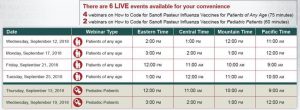 Editorial by Barbara Coats, MD
Editorial by Barbara Coats, MD
WHAT IF?
“What if there was a pill you took one day that lowered your BLOOD PRESSURE, prevented DIABETES, improved your MOOD and protected against DEPRESSION, increased BONE DENSITY and prevented FRACTURES, helped you remain INDEPENDENT as an older adult, enhanced your ability to THINK and gave you more ENERGY?”
“WOULD YOU BE ASKING YOUR DOCTOR TO PRESCRIBE IT FOR YOU?”
– Dr. Robert Sallis in Sports Medicine Bulletin
So why aren’t doctors consistently prescribing this pill to their patients? The “pill” that Dr. Sallis is referring to is walking. Physical activity is associated with decreased cardiovascular disease, diabetes, some forms of cancer, and decreased osteoporosis; it also protects against dementia and benefits mental health. The CDC recommends that adults get at least 150 minutes of physical activity each week, and walking is the easiest activity for patients to do.
The Kansas Academy of Family Physicians supports use of this simple prescription and joins other local organizations in promoting WALKTOBER– a community-wide effort during October to encourage people to accumulate 150 minutes of physical activity per week. In past years, paper prescription pads for exercise were sent to physicians. This year, in cooperation with the Medical Society of Sedgwick County, a Walking Prescription can now be accessed electronically and given to your patients to emphasize the importance of this simple activity for their health. The exercise prescription can be customized with your office logo if desired. Practitioners are free to integrate it into their own EMR or simply bookmark it for use as needed. The prescription includes local resources that can help educate your patients to meet their goals. Take the time to evaluate those resources so that you can direct patients to the ones you feel would be most useful. And please share this information with physician extenders as well.
We are excited to support this effort. The electronic walking prescription and resources page can be customized with your office logo and community resources, please contact Kim Neufeld or call 316-425-5607.
Encourage your patients to participate in WALKTOBER. That may help develop a habit that can bring life-long benefits to their health. Patients can register at Health & Wellness Coalition of Wichita.

 Editorial by Barbara Coats, MD
Editorial by Barbara Coats, MD
 American Board of Family Medicine
American Board of Family Medicine